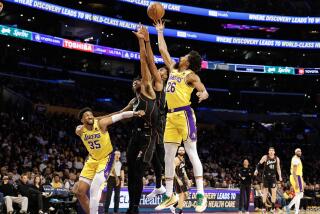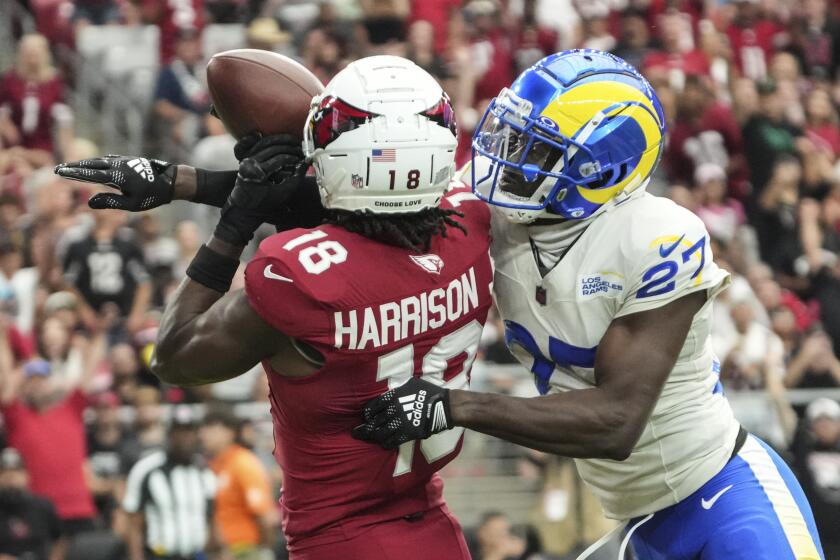Unruly Pistons Follow Rules : NBA playoffs: Detroit’s defenders do what they need to do, and whatever they can get away with, to keep Jordan in check.
CHICAGO — They have held Michael Jordan to 165 points and 45% shooting in the NBA Eastern Conference finals. They have pushed him and clawed him. And, as an early reminder of the routine, they had him inhaling Michigan hardwood early in Game 1.
But these are the Detroit Pistons, so it all seems normal. To them, love may be sacred--see: Magic and Isiah, a kiss is just a kiss--but all’s fair in war and basketball, two separate notions often blurred together.
It’s just that with Jordan, it is more normal:
--Deny him the ball.
--Force him to the sidelines with the ball, using the boundaries as another defender.
--Always rotate off your man to double-team him if he gets within 20 feet of the basket--allowing him to drive the lane means failure.
These are the Jordan Rules, by the best of the best defense in the NBA.
“They take the ball out of my hands,” Jordan said. “It’s basically the same thing that other teams certainly try to do. But they do it very effectively because of the experience of playing together. And the athletes have a lot to do with it.”
If Chicago goes as Jordan goes, and that much seems obvious, there is far less mystery about the Pistons’ success against the Bulls. Detroit held him to 26 points a game during the regular season, almost eight below his average, and won four of five meetings.
In the conference finals, which the Pistons can clinch with a victory tonight at Chicago Stadium, the trend has continued:
--Game 1. Jordan scores 34 points, but only eight in the second half, and the Pistons win, 86-77.
--Game 2. Jordan makes only five of 16 shots and scores 20 points as the Pistons win, 102-93.
--Game 3. Jordan crosses up the Pistons by becoming more of a point guard. He gets 47 points, and the Bulls win, 107-102.
--Game 4. Forty-two points, as the Bulls win, 108-101.
--Game 5. Defense returns, Jordan squeezing out only 22 points. The Pistons win, 102-93.
Even though he is averaging 33 points in the five games, that’s still seven fewer than Jordan got in the first two rounds against Milwaukee and Philadelphia. Not coincidentally, his two best showings against the Pistons have come at Chicago. More significantly, Detroit’s two most severe applications of the Jordan Rules occurred at Detroit.
“It’s basically the same things, but different efforts,” Jordan said. “At home, they certainly seem more inspired to do it a lot better because of being (in) familiar surroundings. On the road, because of the crowd, because of other players on my team stepping up to give some offensive output to relieve some of that defensive pressure off myself, it makes it more difficult for them to put the type of pressure they want on me.”
The Pistons are likely to succeed where other teams fail, for obvious reasons. Joe Dumars is one of the best defensive guards around. Dennis Rodman, a forward, was recently named the NBA defensive player of the year. Detroit subscribes to the notion that offense is execution, but defense is, pure and simple, hard work.
So, talent makes the Pistons a better bet to stop Jordan than any other team. But is their plan, embodied in these Jordan Rules, really different from the defensive strategies used by 25 other teams?
The Bulls say no.
“It’s just more magnified when you’re in the playoffs,” said Craig Hodges, a reserve guard. “Things are so much more intense when every possession counts.”
Some Pistons say no.
“I’m sick of all this talk about the Jordan Rules,” Rodman said. “I just think we do a lot of things better as a team. We rotate quicker.”
Detroit regards the inner workings of the Jordan Rules as something akin to a national secret.
“I’d rather not talk about that,” Mark Aguirre said after a recent game. “But evidently, we must do something different because we handle him better than anyone else.”
But everyone double-teams Jordan when he has the ball, everyone tries to cut off penetration down the middle.
“Yeah,” Aguirre said. “But they don’t do it like we do.”
This cloak-and-dagger secrecy goes along with the Pistons’ swashbuckler image, so why change a good thing? Besides, if it plays with the Bulls’ minds to think something extra may be happening, all the better.
More to Read
Go beyond the scoreboard
Get the latest on L.A.'s teams in the daily Sports Report newsletter.
You may occasionally receive promotional content from the Los Angeles Times.










